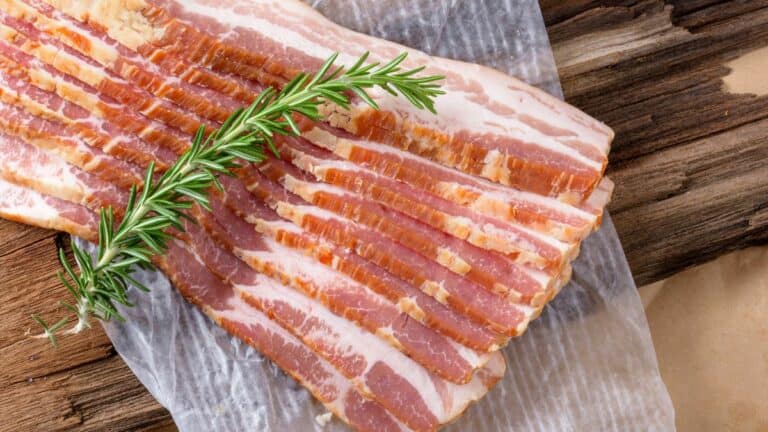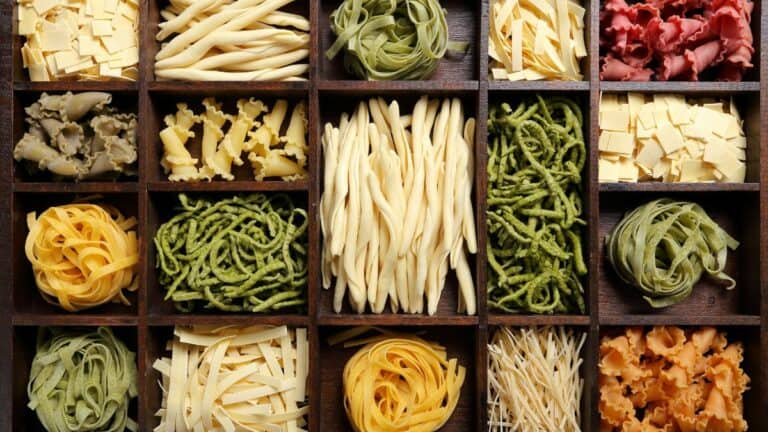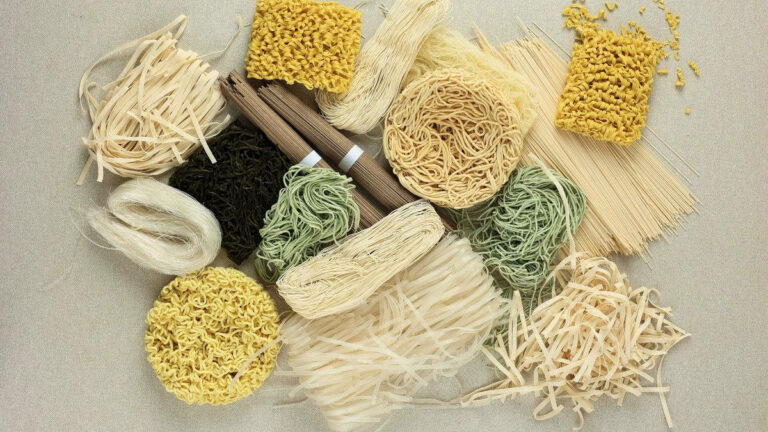Roll with It: 30 Types of Sushi Rolls from Traditional Favorites to Trendy Creations
Discover 30 must-try sushi rolls, ranging from beloved traditional favorites to the latest trendy creations. Perfect for sushi newcomers and seasoned fans alike, this collection has a variety of flavors and styles to suit every palate. Dive in and find your next sushi obsession.
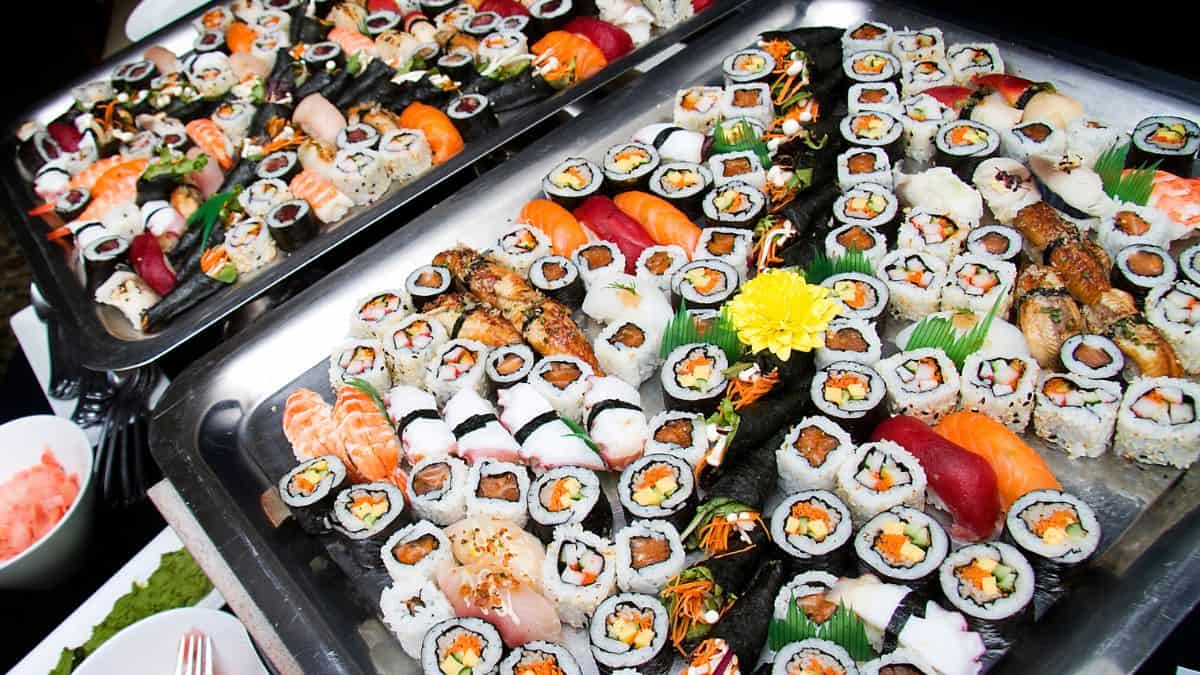
Nigiri
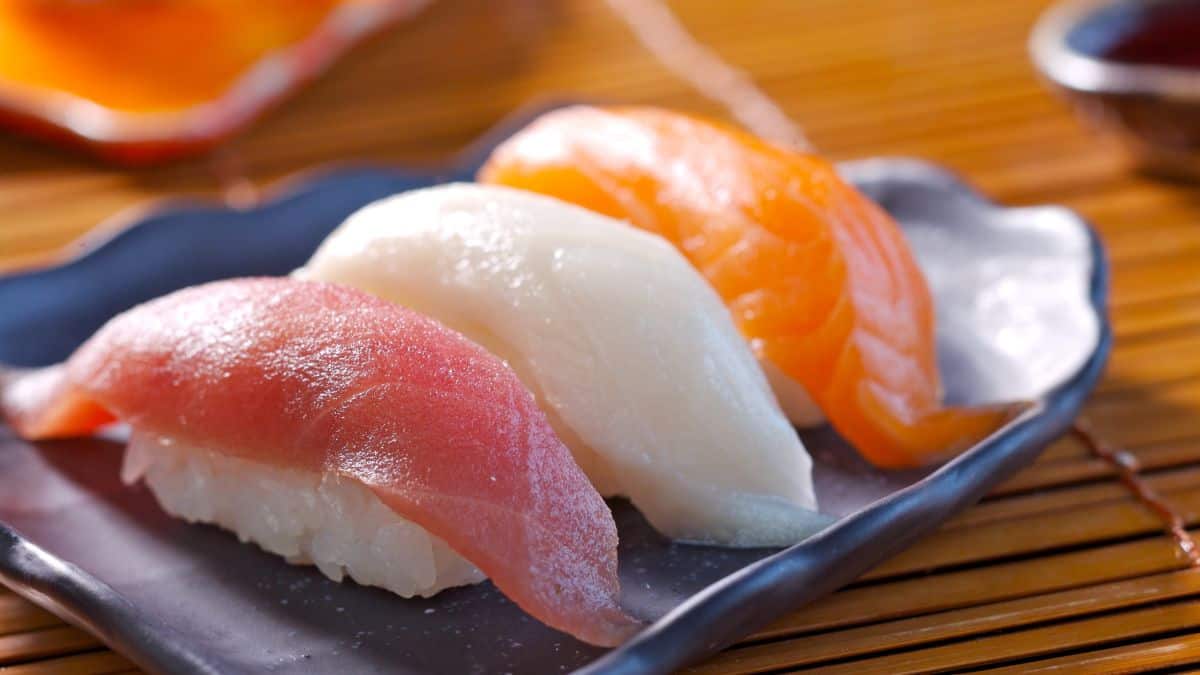
Nigiri is a simple yet elegant form of sushi that highlights the freshness of the fish. It consists of a slice of raw fish, such as tuna, salmon, or shrimp, placed atop a small mound of vinegared rice. A bit of wasabi is often added between the fish and rice to enhance the flavor.
Sashimi
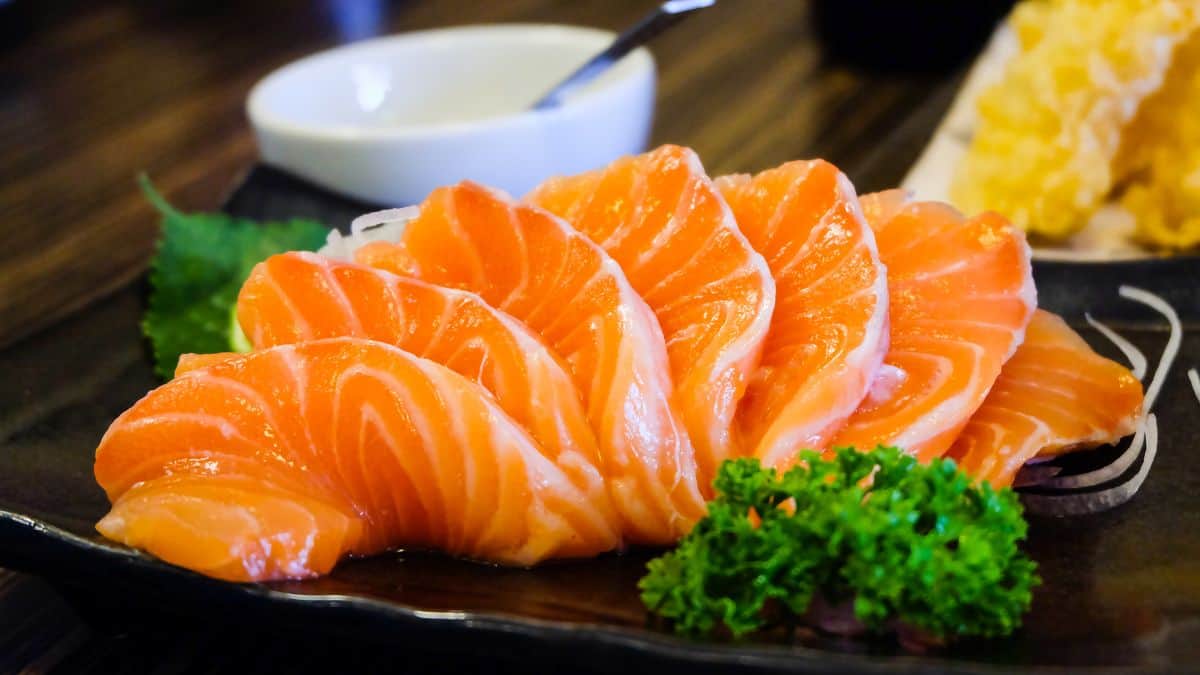
Sashimi is thinly sliced raw fish or seafood served without rice, making it a pure expression of the fish’s flavor and texture. Popular types of sashimi include tuna, salmon, and octopus. Sashimi is often accompanied by soy sauce, wasabi, and pickled ginger to complement the taste.
Maki
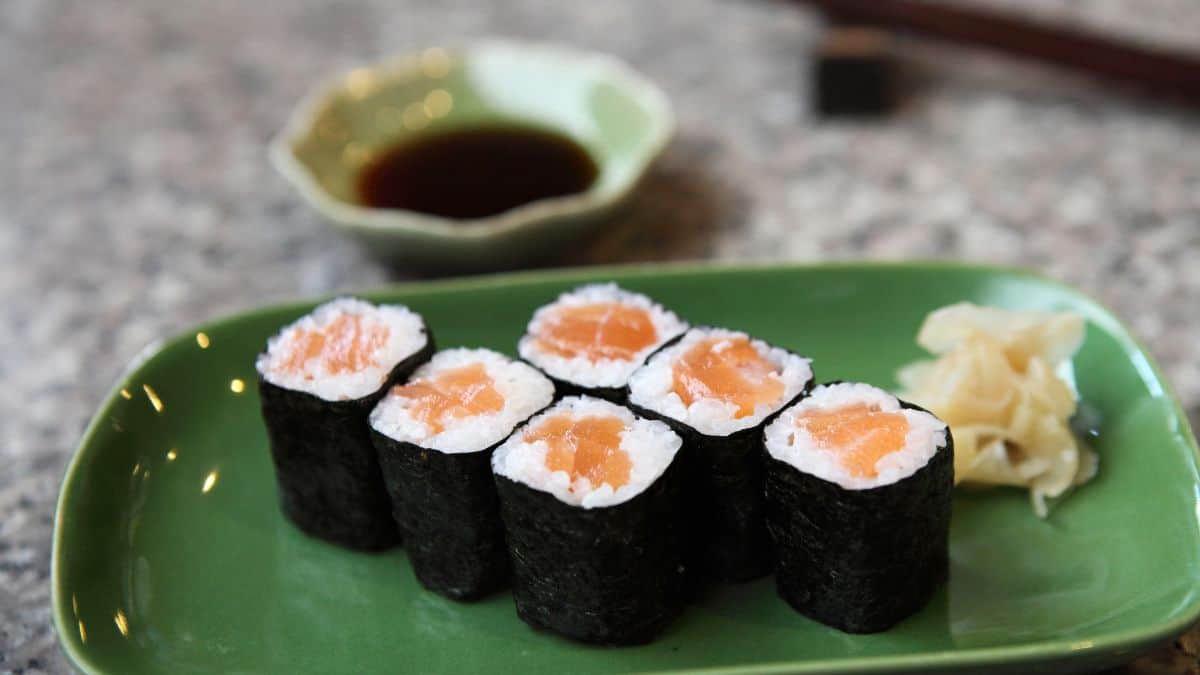
Maki involves rolling fish, vegetables, and rice in a sheet of seaweed (nori) and slicing it into bite-sized pieces. Maki is versatile and can be filled with a wide variety of ingredients, making it a favorite for sushi lovers of all preferences.
Uramaki
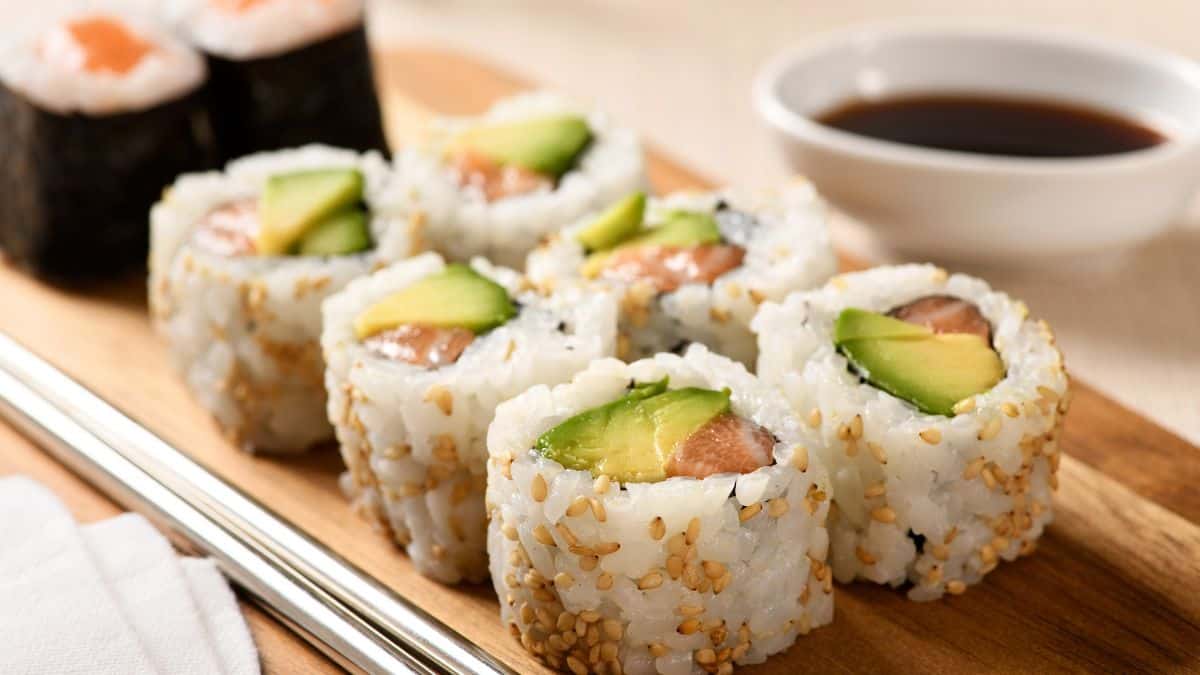
Uramaki, or inside-out rolls, have rice on the outside and seaweed on the inside. They can be filled with various fillings, such as fish, vegetables, or tempura. The rice exterior is often coated with sesame seeds or fish roe.
Temaki
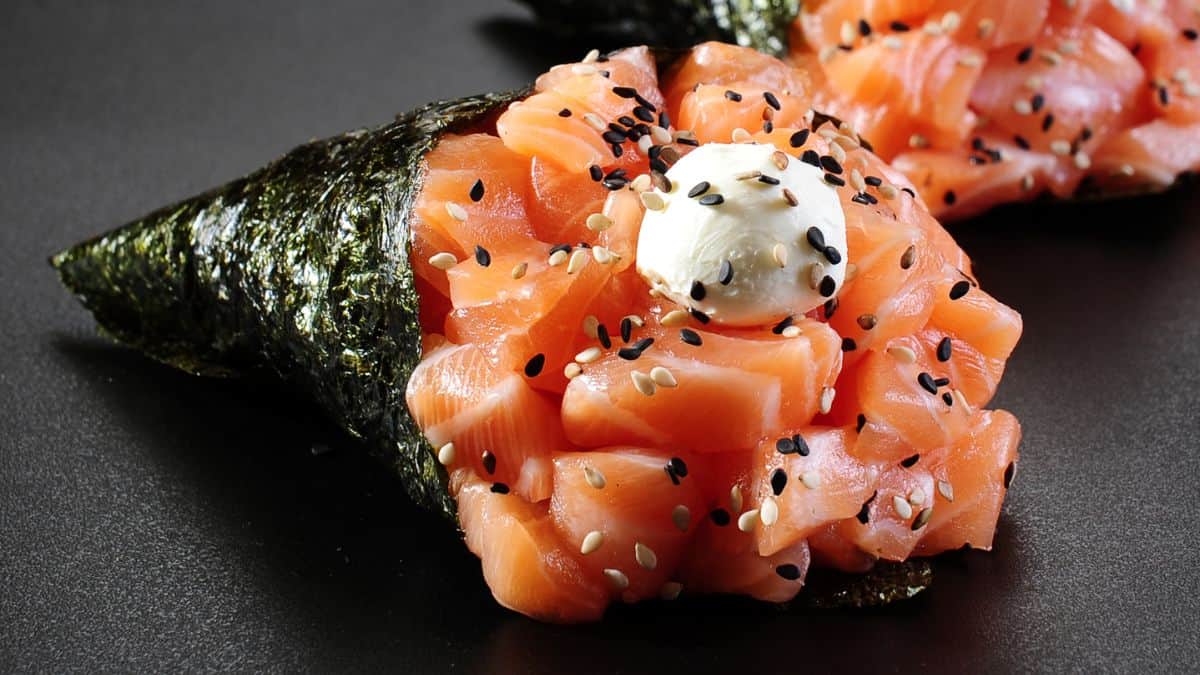
Temaki, also known as hand rolls, are cone-shaped pieces of seaweed filled with sushi rice, fish, and vegetables. Designed to be eaten with your hands, they offer a more casual sushi experience.
Gunkan Sushi
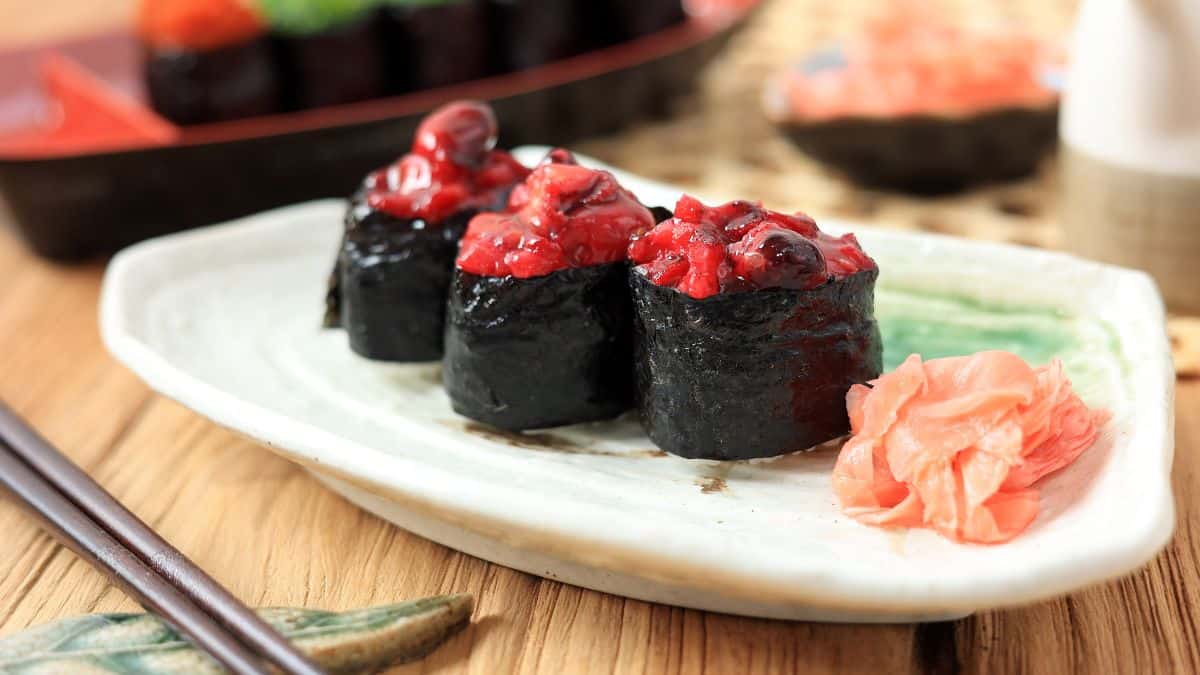
Gunkan means “battleship,” and in this sushi, the rice is wrapped in a strip of seaweed to form a boat shape. It is then topped with soft or loose ingredients like salmon roe, sea urchin, or chopped scallops. The seaweed helps contain the ingredients.
Oshizushi (Pressed Sushi)
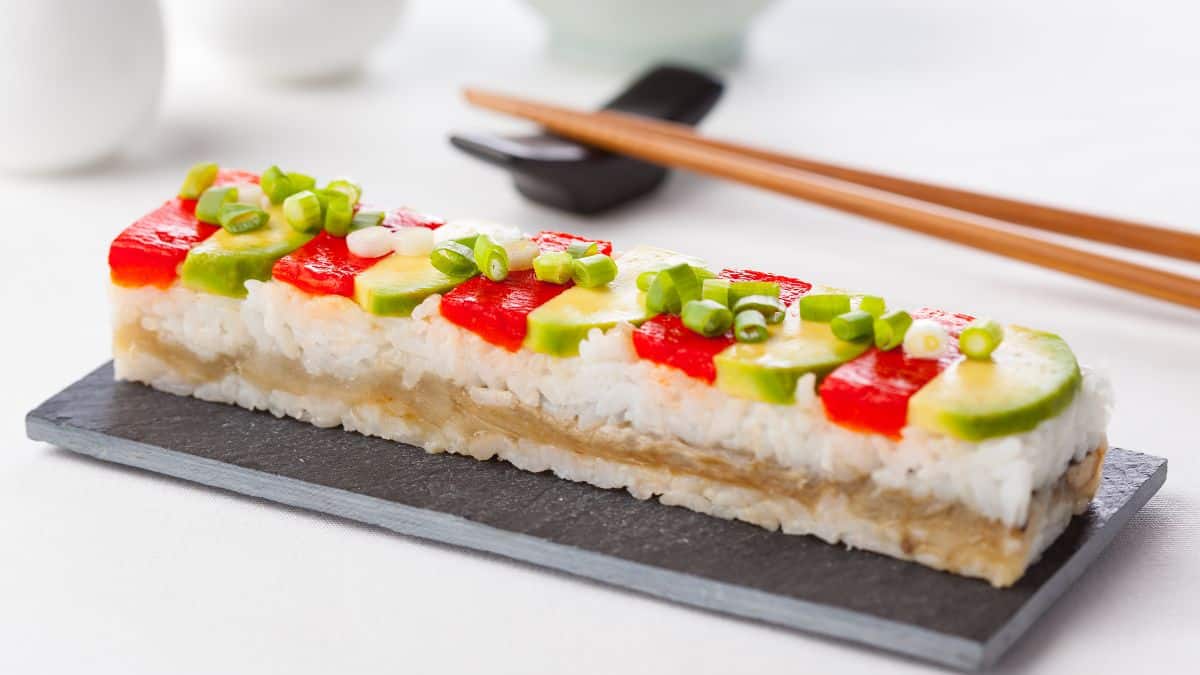
Oshizushi is a style of sushi where the fish and rice are pressed into a rectangular mold, creating a compact, layered block of sushi that is then sliced into smaller pieces. This method results in a dense, flavorful bite.
Inarizushi
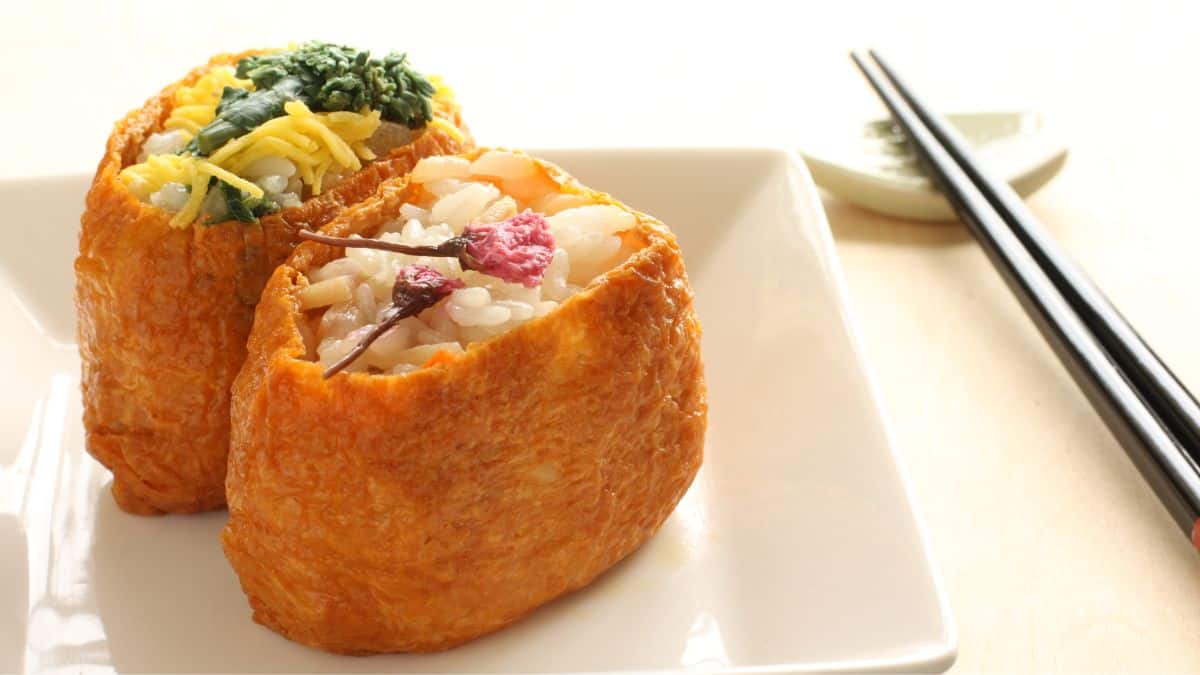
Inarizushi is made by stuffing vinegared rice into a pouch made of deep-fried tofu, known as inari. The tofu adds a sweet and savory flavor to the sushi, and it’s often served as a vegetarian option. Inarizushi is easy to eat and is a popular choice for picnics and bento boxes.
Chirashizushi (Scattered Sushi)
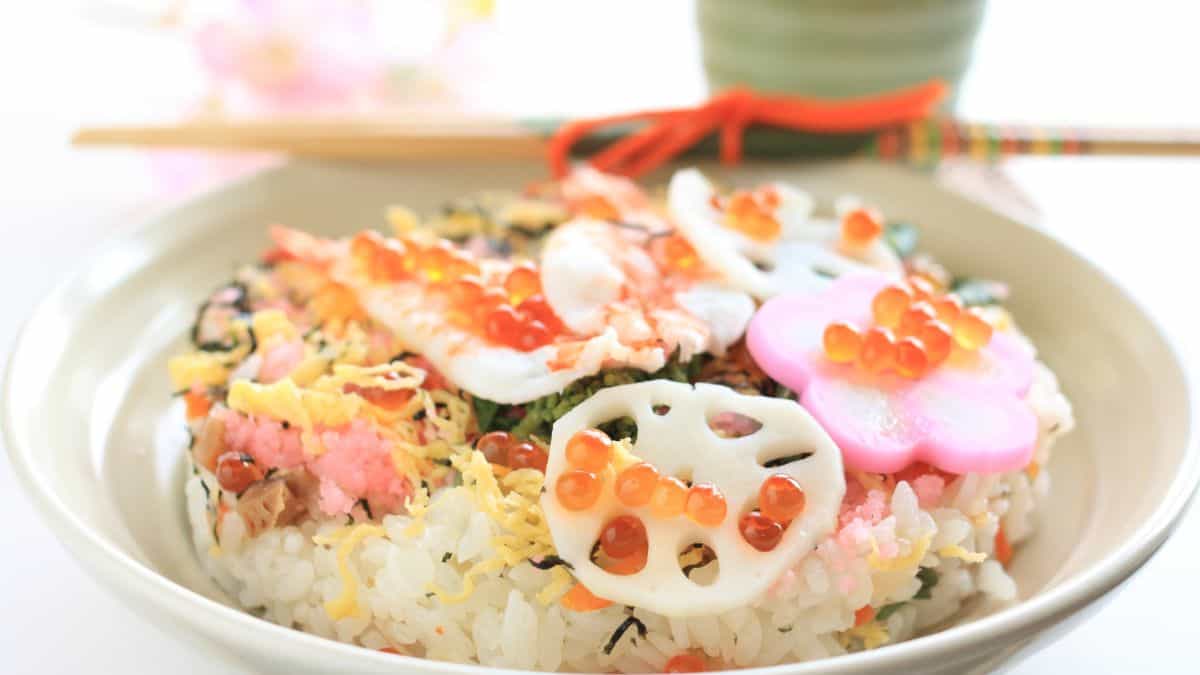
Chirashizushi is a type of sushi served in a bowl. Various toppings, such as sashimi, vegetables, and eggs, are scattered over a bed of sushi rice. This dish is colorful, customizable, and perfect for those who want to enjoy a variety of flavors in one meal. Chirashizushi is often served on special occasions in Japan.
Temari Sushi
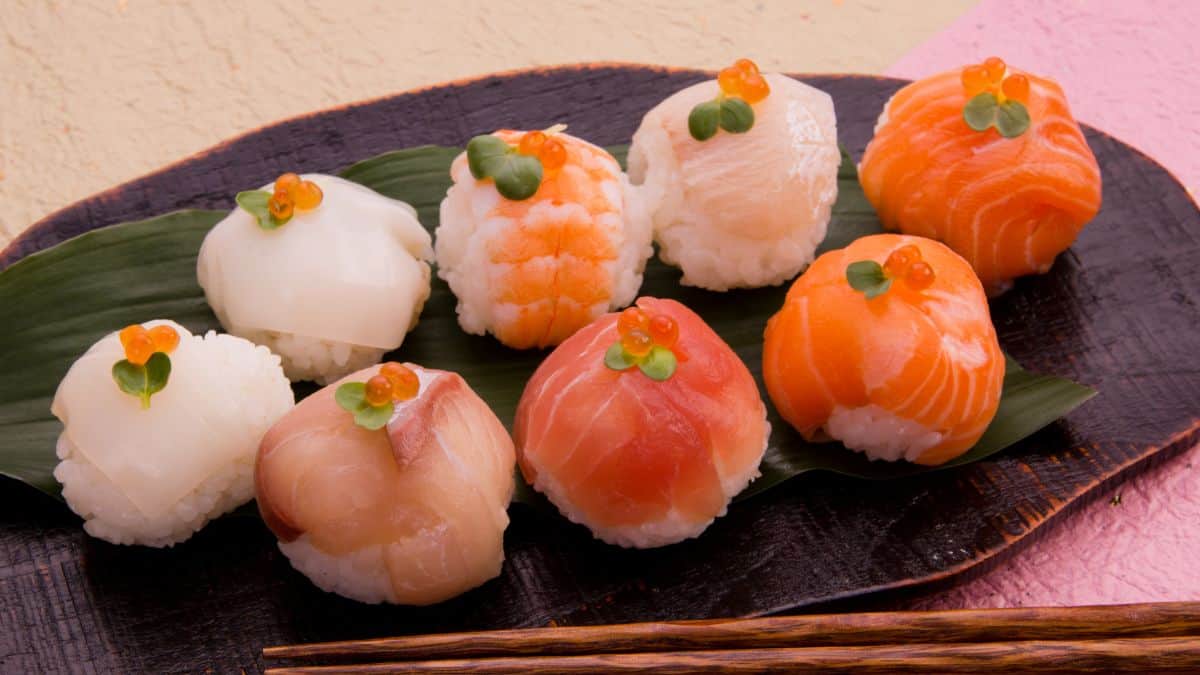
Temari sushi consists of small, round sushi balls made by pressing sushi rice and fish or vegetables together in plastic wrap. These bite-sized sushi balls are often beautifully presented and served on festive occasions. Temari sushi is a fun and creative way to enjoy sushi.
Narezushi
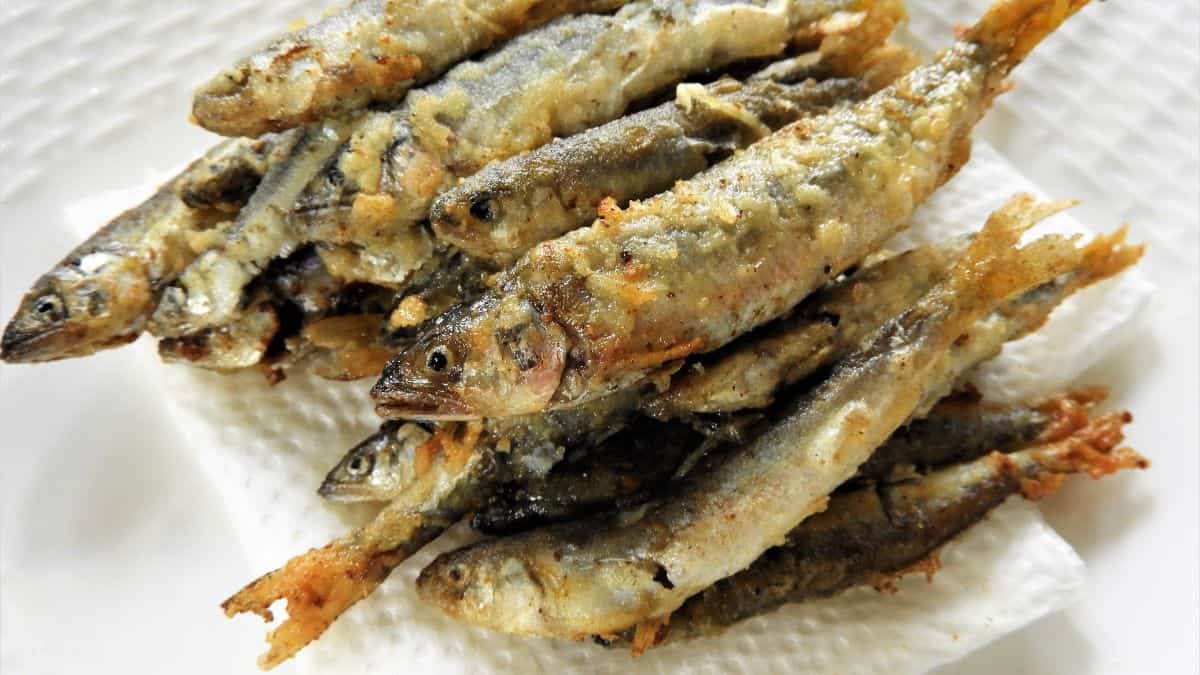
Narezushi is a traditional form of fermented sushi in which fish is packed in salt and rice and left to ferment for several months. This ancient method results in a strong, pungent flavor that is considered an acquired taste. Narezushi is one of the oldest forms of sushi, offering a glimpse into the history of sushi-making.
Hosomaki
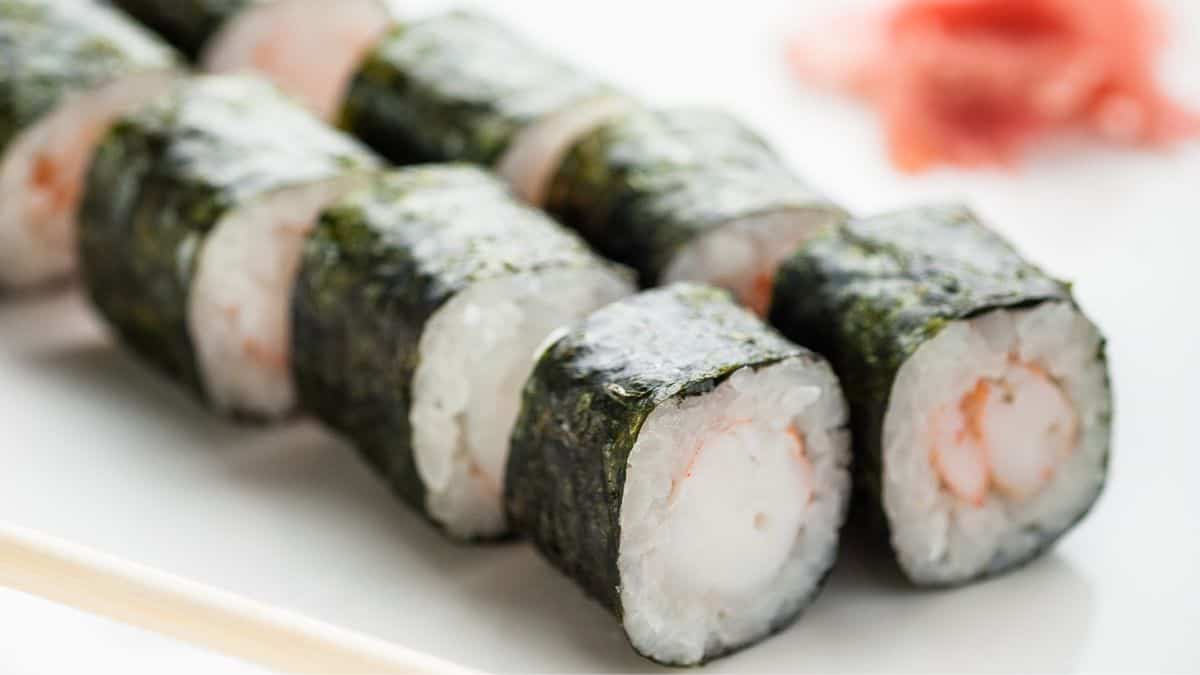
Hosomaki are thin rolls with just one filling wrapped in rice and seaweed. These delicate rolls are smaller than other sushi rolls, making them a light and simple option.
Futomaki
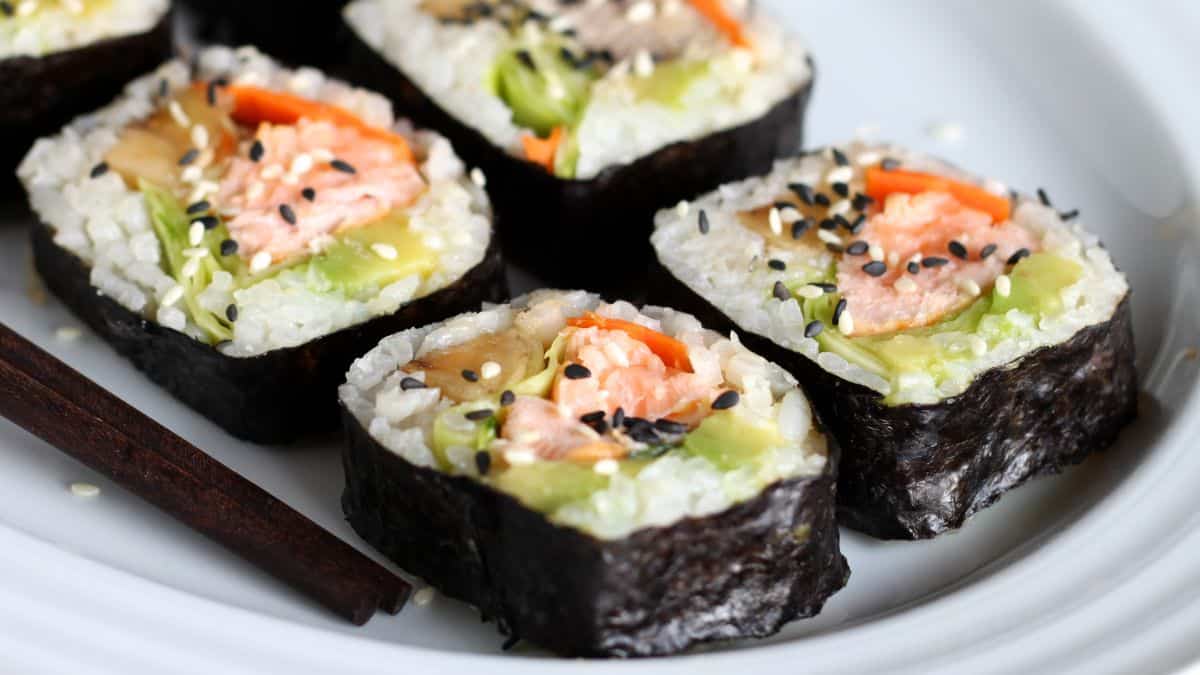
Futomaki are thick rolls that typically contain several ingredients, such as cucumber, tamago (a Japanese omelet), and pickled vegetables. They are larger and more filling than hosomaki, making them ideal for sharing. Futomaki is often enjoyed during special occasions and celebrations.
Kappamaki
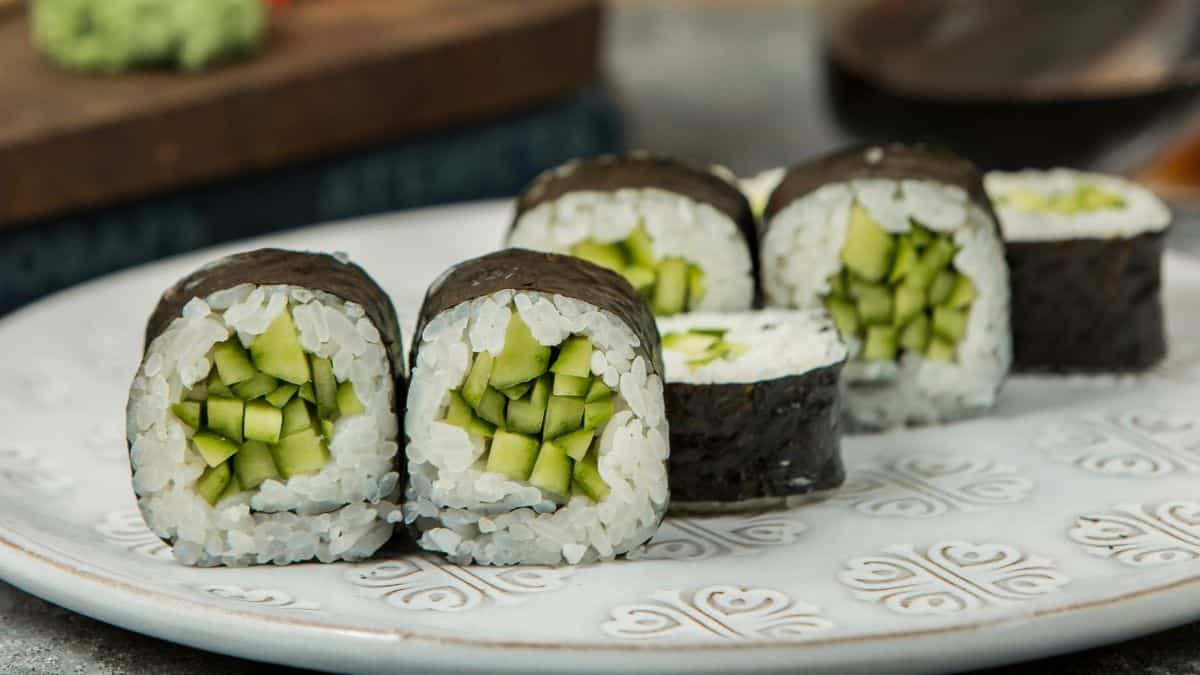
Kappamaki is a simple sushi roll with cucumber as the main filling, wrapped in rice and seaweed. Named after the mythical water creature, the kappa, this roll is light and refreshing and often served as a palate cleanser between more decadent sushi varieties.
Unagi Nigiri
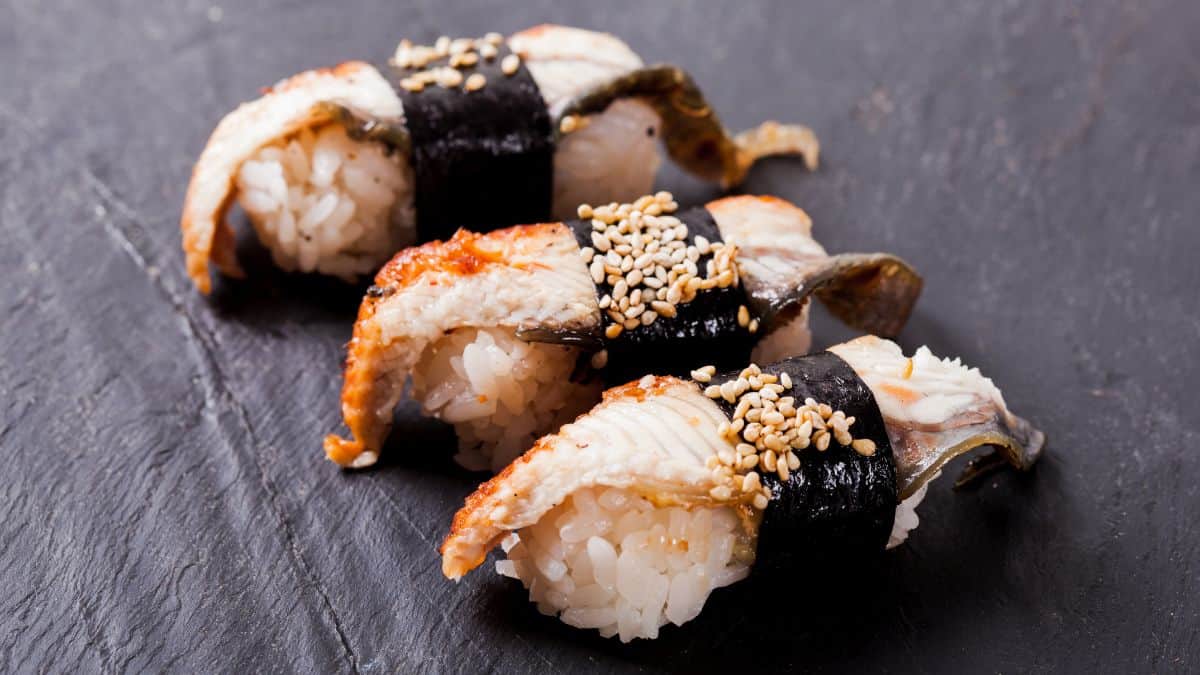
Unagi nigiri is made with grilled freshwater eel (unagi) glazed with a sweet soy-based sauce and placed on top of a small mound of sushi rice. It is often served with a sprinkle of sesame seeds or a cucumber slice.
Toro Nigiri
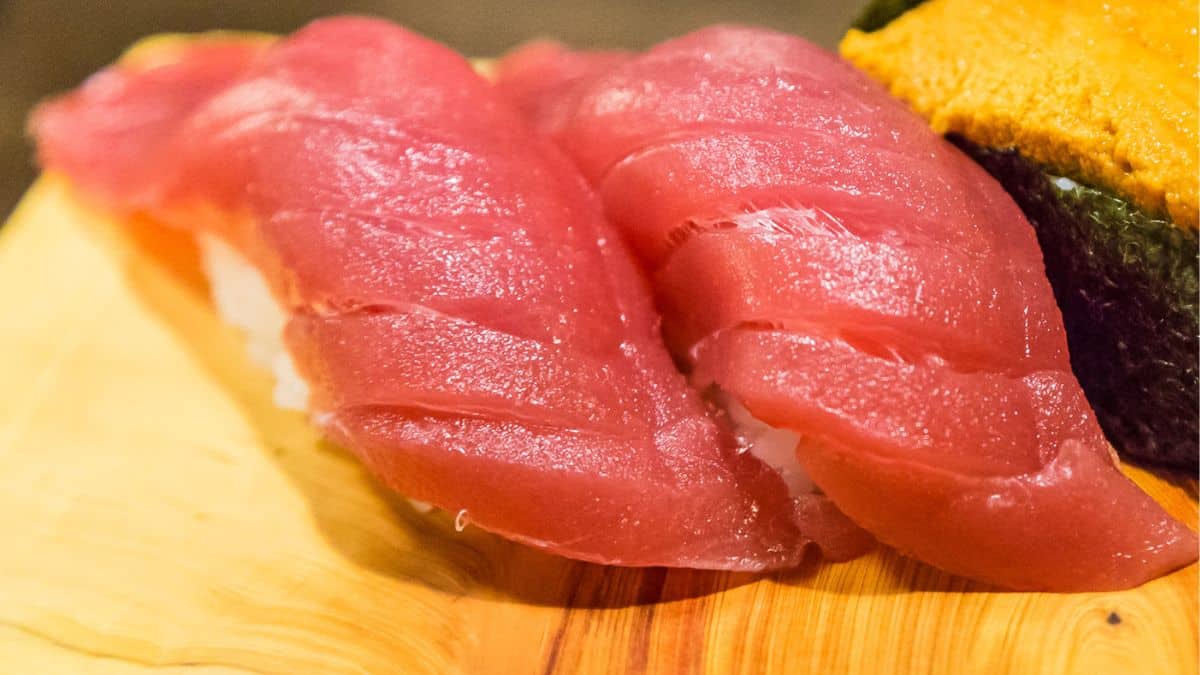
Toro nigiri is made with fatty tuna, known for its rich, buttery texture and melt-in-your-mouth quality. Due to the quality of the fish, this luxurious sushi option is highly prized and often more expensive.
Hotate Nigiri
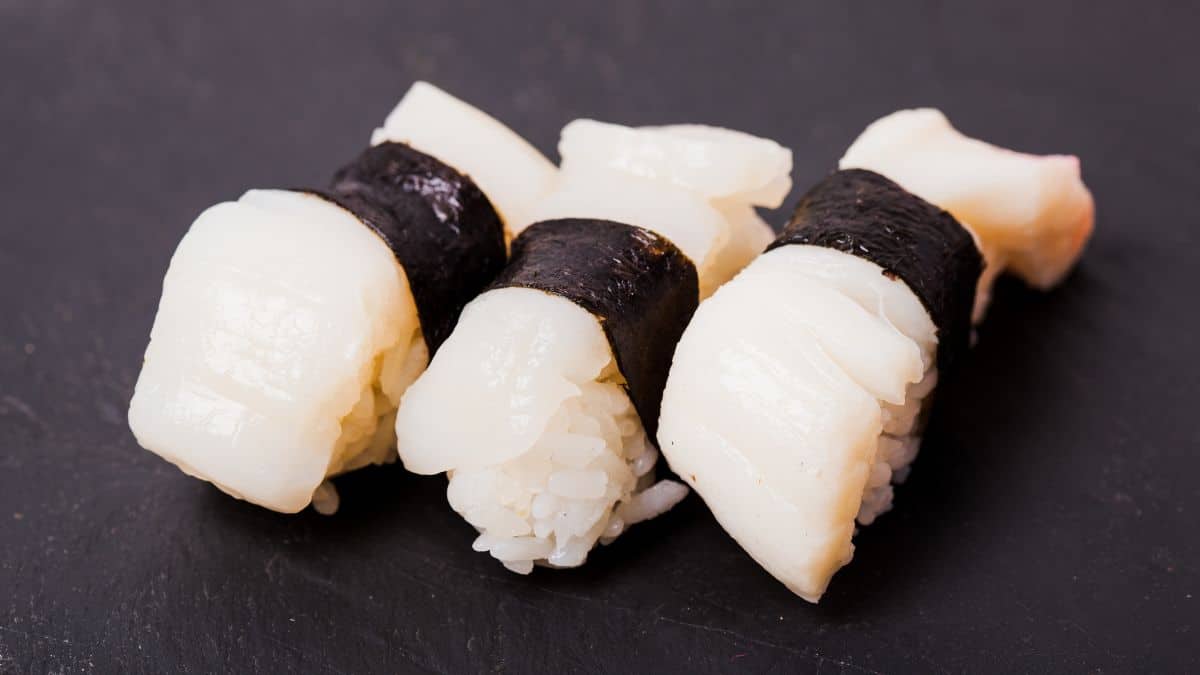
Hotate Nigiri consists of delicate, sweet scallops (hotate) placed atop a mound of vinegared sushi rice. The scallops are often served raw, showcasing their tender texture and natural sweetness, and may be seasoned with a touch of wasabi or soy sauce.
Ebi Nigiri
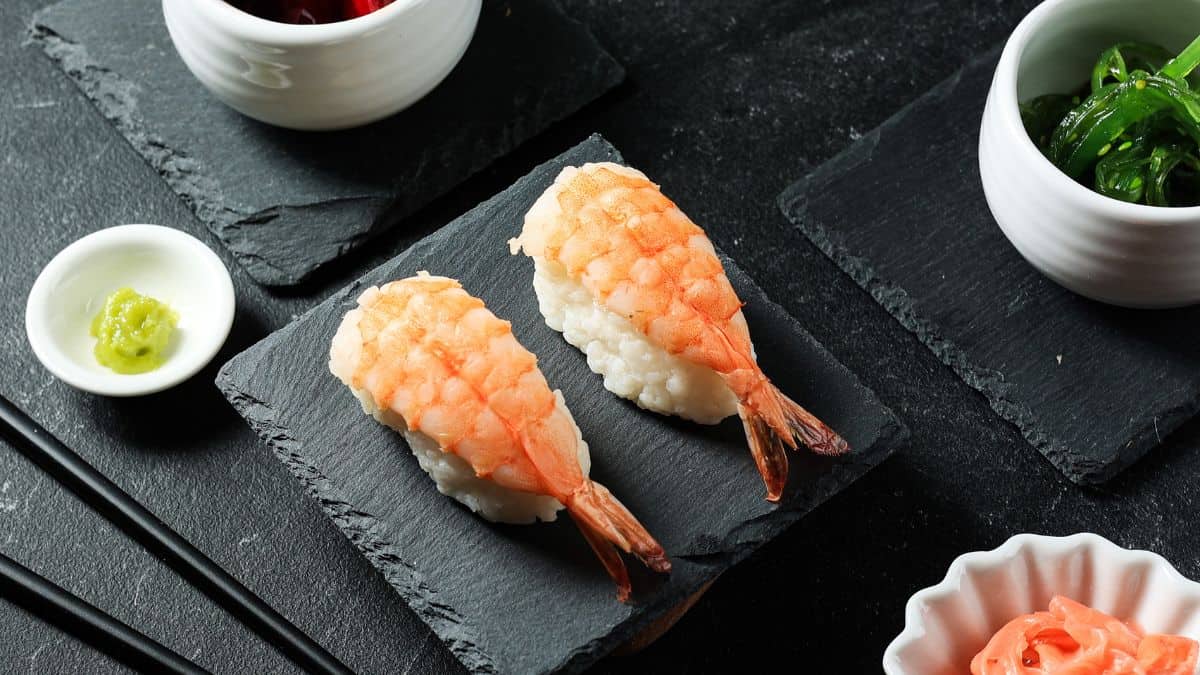
Ebi nigiri is made with boiled or steamed shrimp placed on top of sushi rice. The shrimp is sweet and tender, making it a mild and approachable option for sushi beginners.
Anago Nigiri
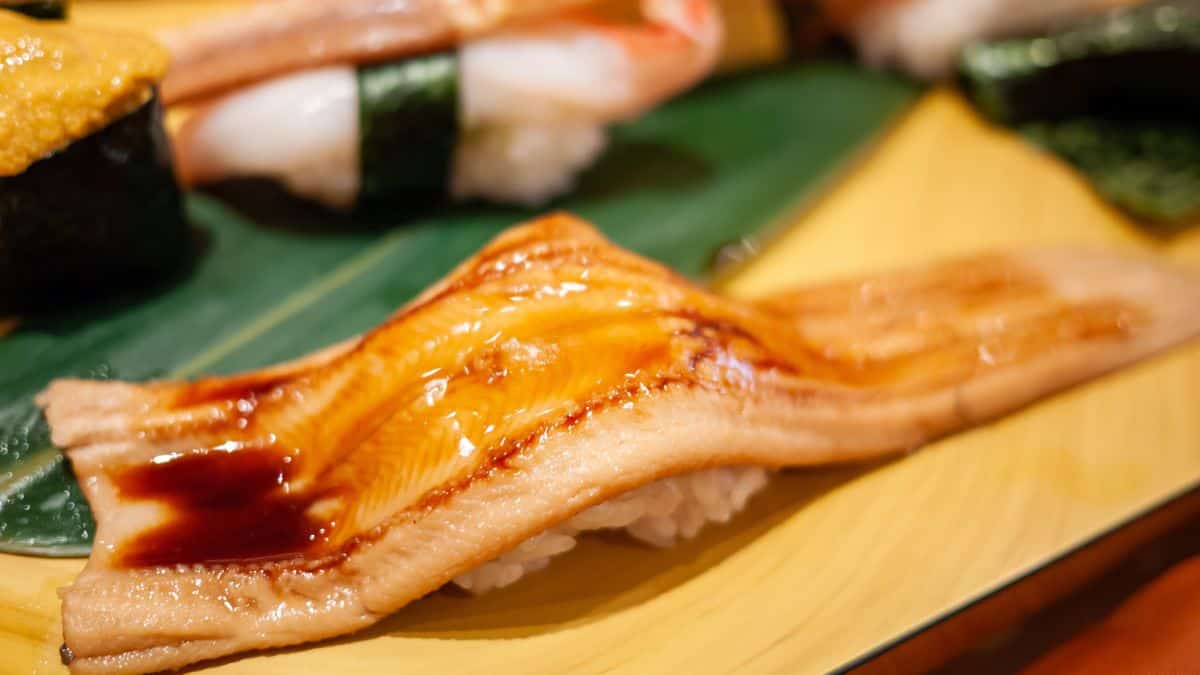
Anago nigiri is made with seawater eel (anago) grilled and glazed with a light soy-based sauce before being placed on top of sushi rice. Anago has a more delicate flavor than unagi, offering a slightly sweet and savory taste that pairs beautifully with the rice.
Tamago Nigiri
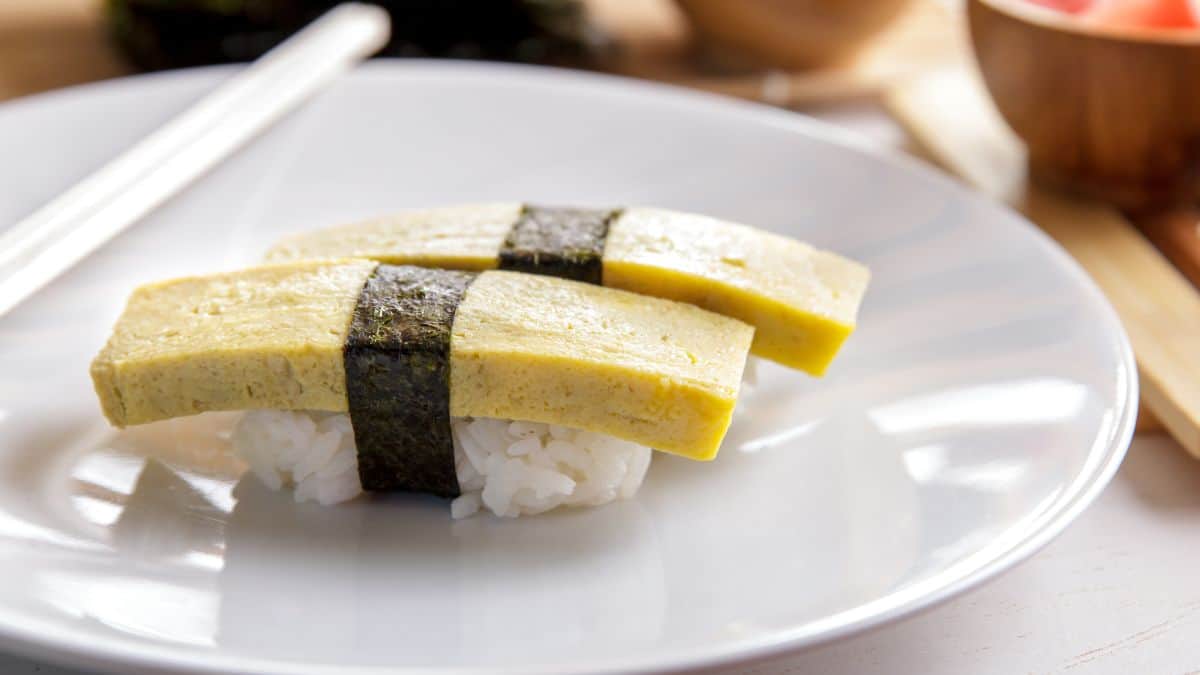
Tamago nigiri is a sweet, layered omelet (tamago) placed on top of sushi rice, often secured with a small strip of seaweed. The tamago is made with eggs, sugar, and soy sauce, giving it a unique sweet and savory flavor. It’s a popular choice for those who prefer a non-fish sushi option.
California Roll
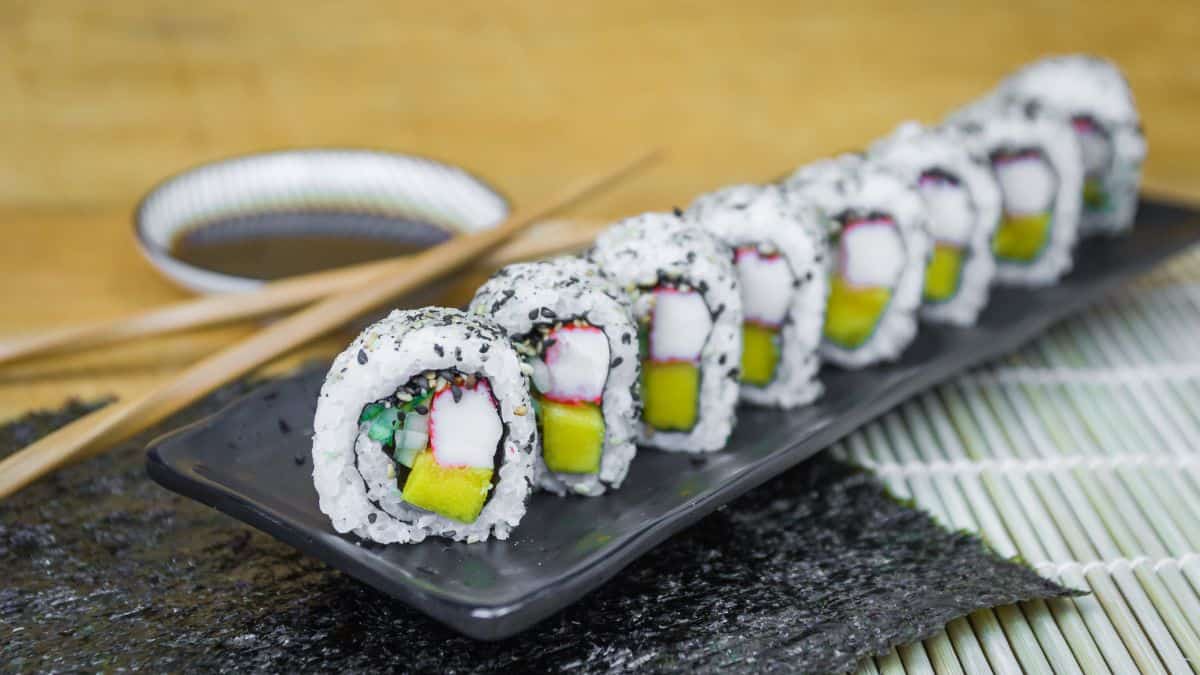
The California Roll is a popular type of uramaki (inside-out roll) that has imitation crab, cucumber, and avocado, all wrapped in rice and seaweed. The rice is typically coated with sesame seeds or tobiko (fish roe). It’s a mild sushi roll, making it an excellent choice for sushi beginners.
Spicy Tuna Roll
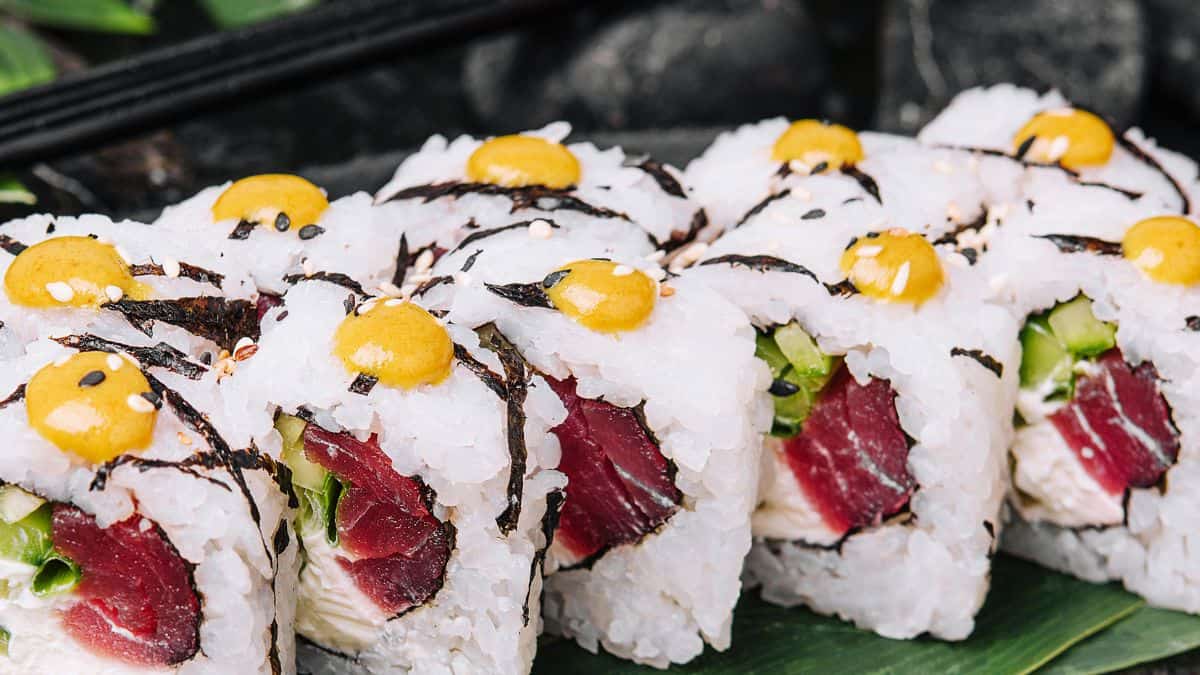
The Spicy Tuna Roll is another type of uramaki. It’s made with a filling of tuna mixed with sriracha, mayonnaise, and cucumber. The roll is wrapped in rice and seaweed, and the heat from the sriracha gives it a nice kick. It’s a favorite among those who enjoy a bit of spice in their sushi.
Dragon Roll
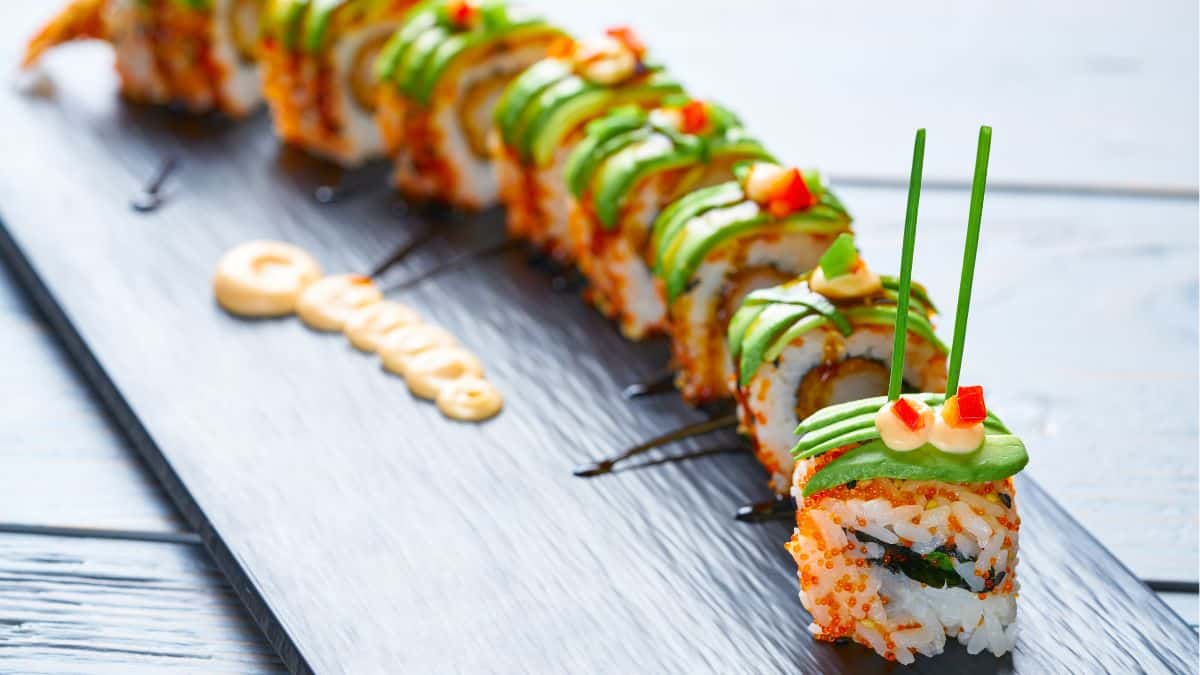
The Dragon Roll is made with eel and cucumber inside, topped with thin slices of avocado, and drizzled with eel sauce. The avocado slices are arranged to resemble the scales of a dragon, making this roll as visually appealing as it is delicious.
Philadelphia Roll
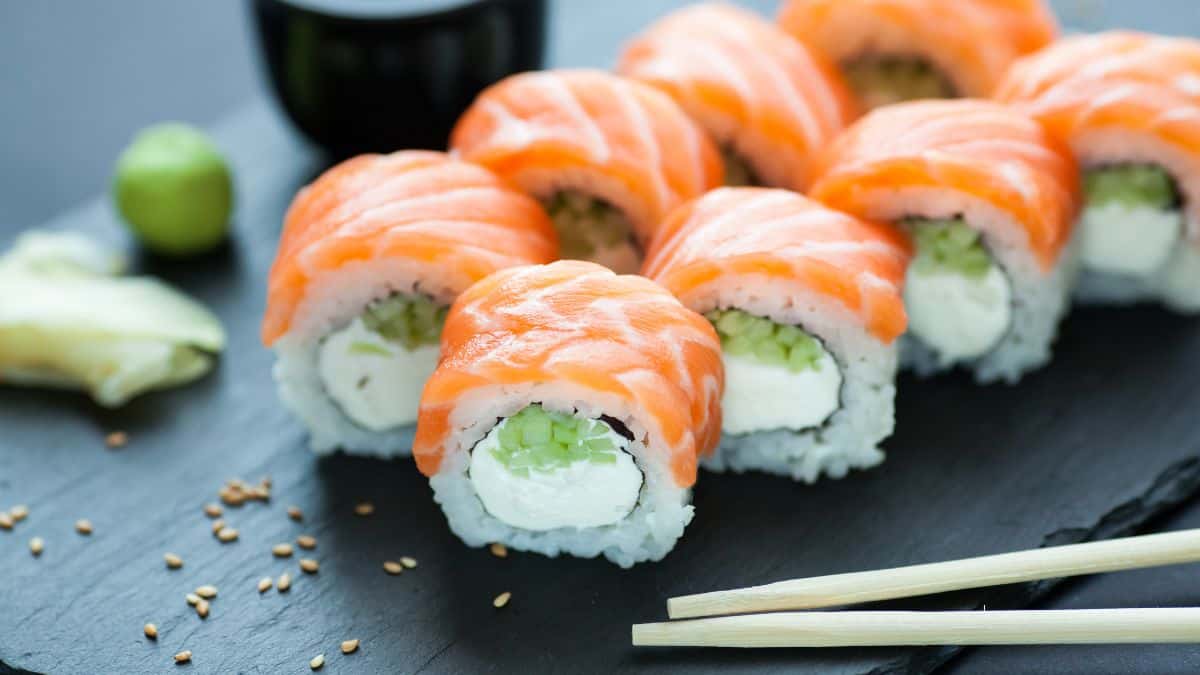
The Philadelphia Roll combines smoked salmon, cream cheese, and cucumber, offering a rich and creamy texture. The cream cheese adds a smooth, tangy flavor that pairs well with the smoky salmon.
Rainbow Roll
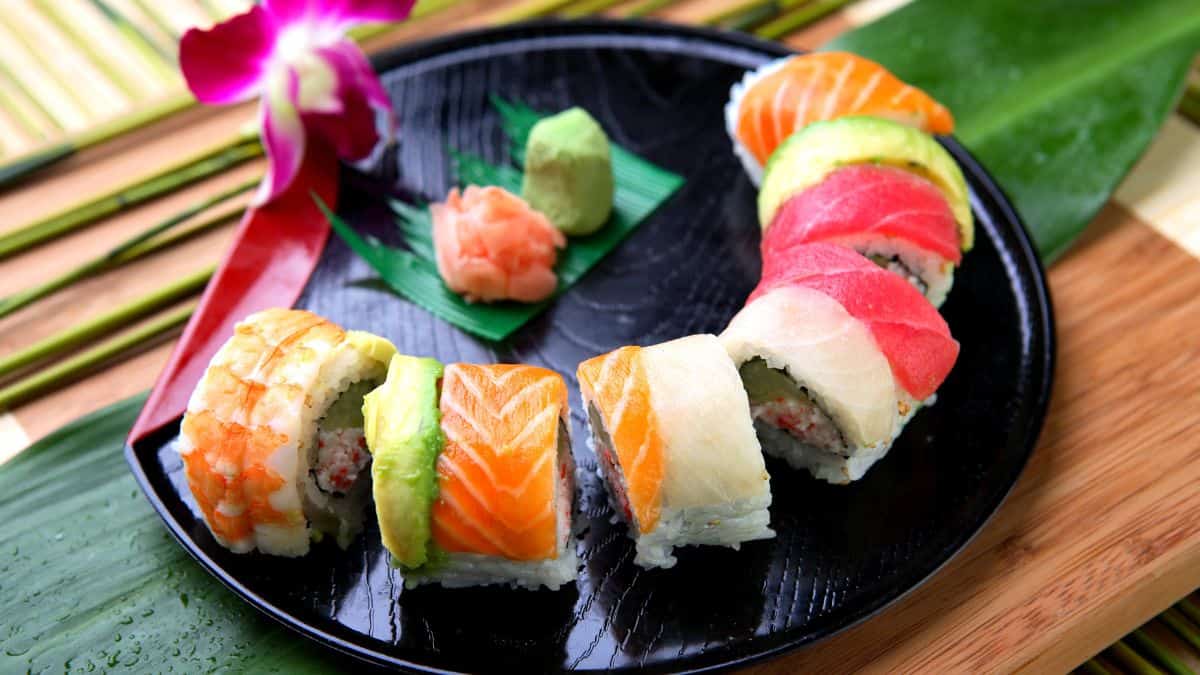
The Rainbow Roll is a California roll topped with a variety of fresh fish slices, such as tuna, salmon, and yellowtail, along with avocado. This colorful roll offers a range of flavors and textures in every bite, making it a popular choice for sushi lovers.
Spider Roll
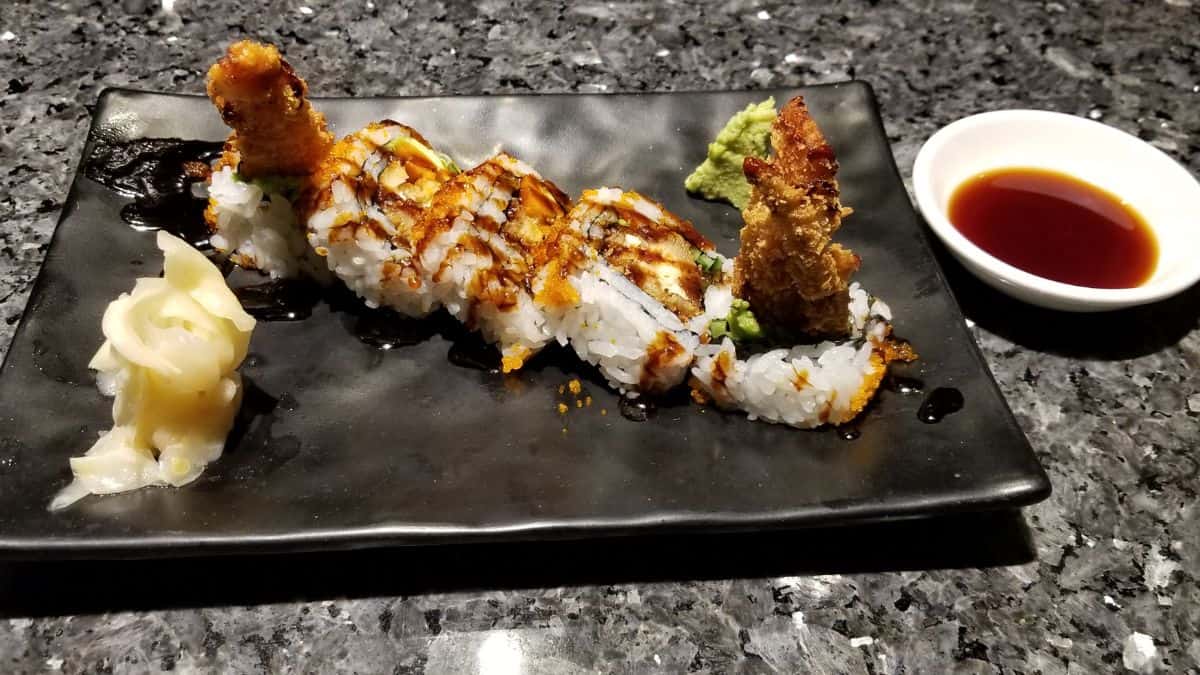
The Spider Roll is made with fried soft-shell crab, cucumber, avocado, and sometimes spicy mayo. The crispy crab provides a satisfying crunch, while the creamy avocado and spicy mayo add layers of flavor.
Caterpillar Roll
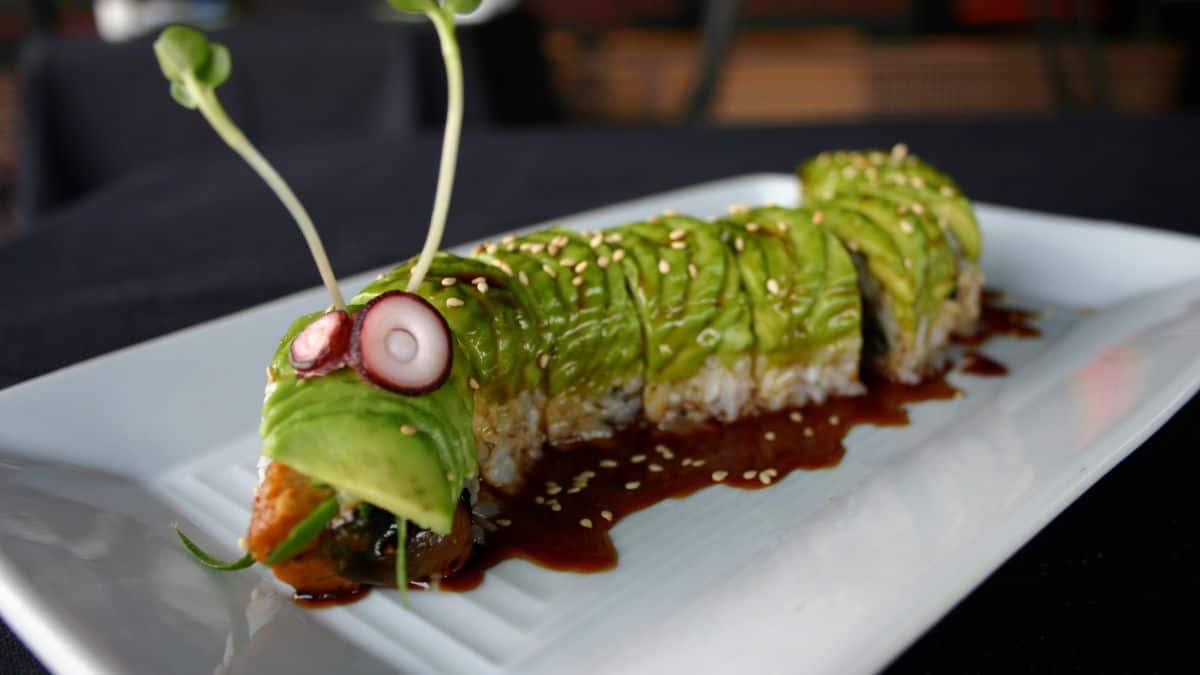
The Caterpillar Roll includes eel and cucumber inside, with avocado layered on top to resemble the segments of a caterpillar. The roll is often drizzled with eel sauce, giving it a sweet and savory flavor.
Tiger Roll
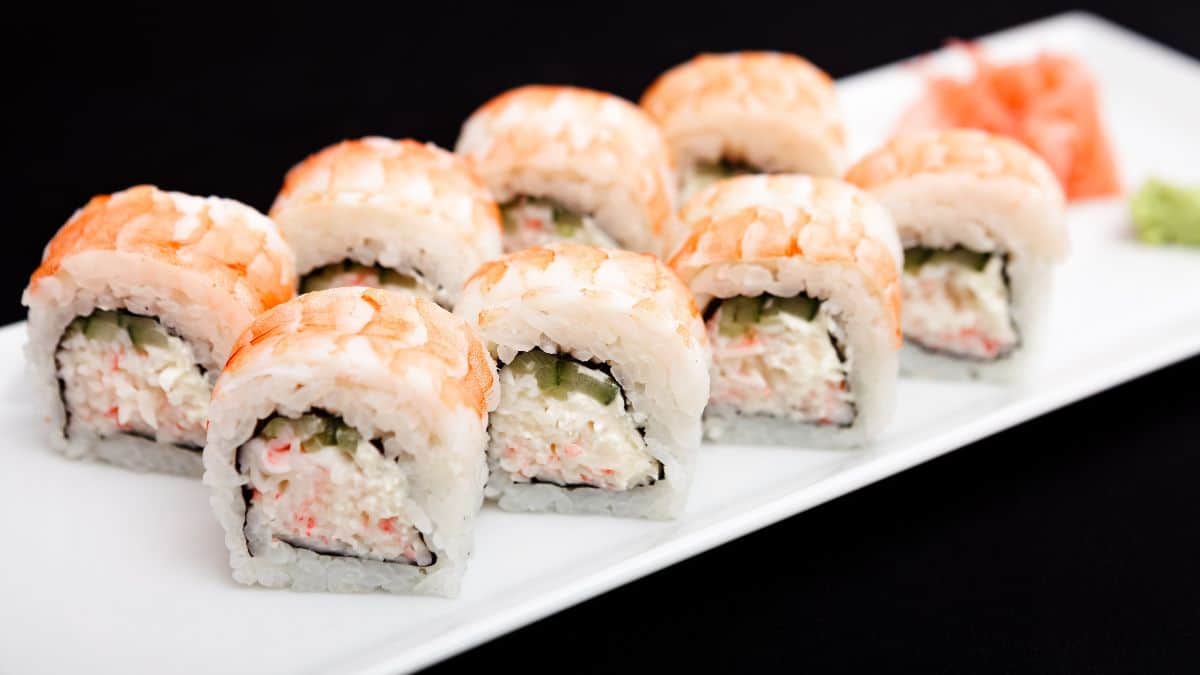
The Tiger Roll features a combination of spicy tuna and cucumber, topped with thin slices of avocado and shrimp tempura. The roll is often garnished with a drizzle of spicy mayo and eel sauce, giving it a bold, flavorful kick with a satisfying crunch.
Crunchy Roll
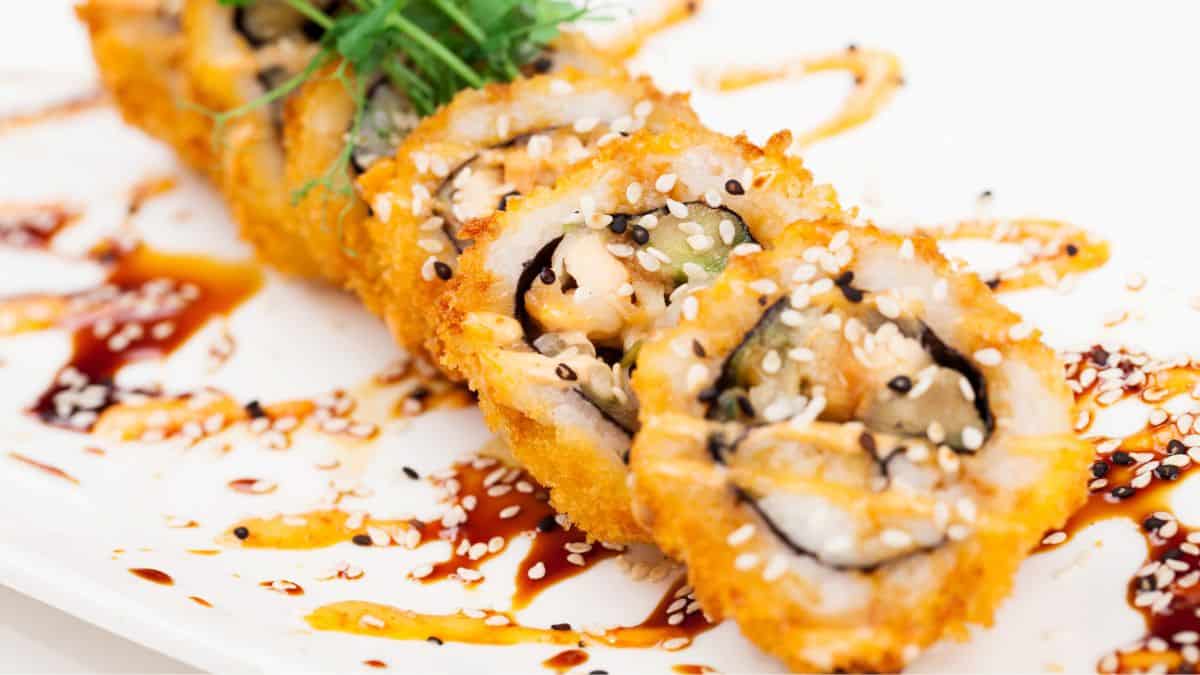
The Crunchy Roll has tempura flakes or panko breadcrumbs on the outside, adding a crispy texture to the roll. Inside, you’ll find ingredients like shrimp, cucumber, and avocado, creating a delightful contrast of textures.
Volcano Roll
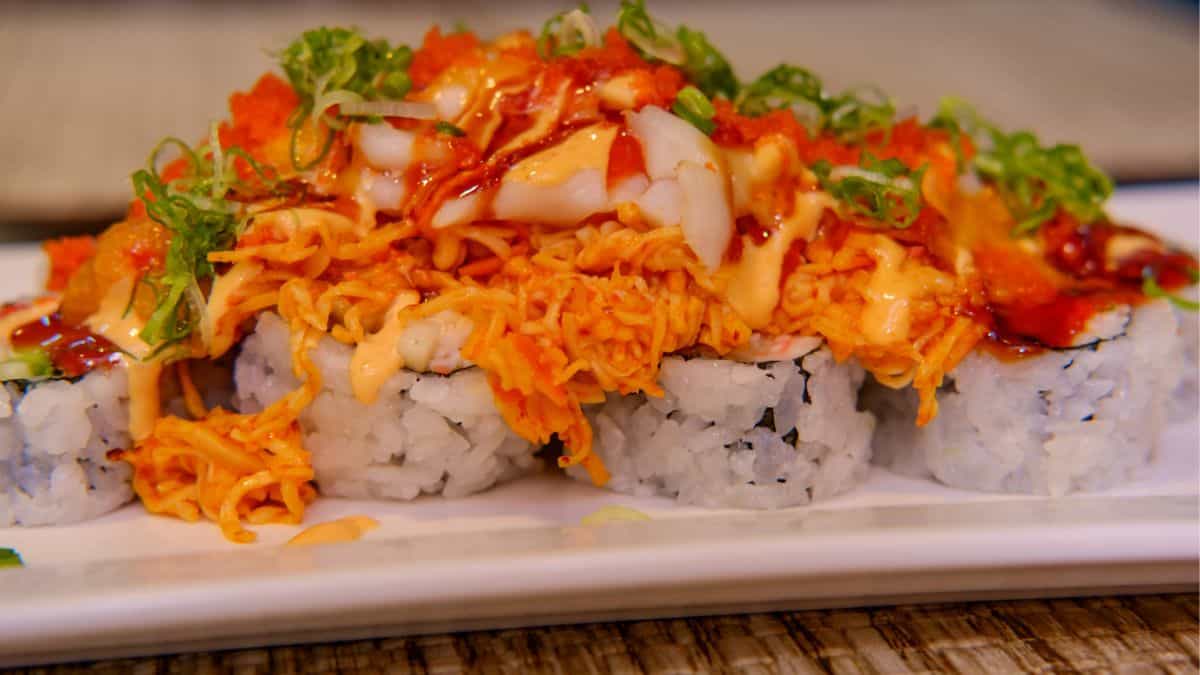
The Volcano Roll has a baked topping of seafood, such as crab or scallops, mixed with spicy mayo and other flavorful ingredients. This roll is often finished with a drizzle of eel sauce and a sprinkle of spicy or crunchy elements, offering a warm, savory, and slightly tangy flavor profile.

